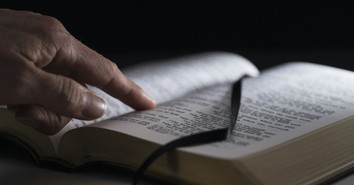Bible Pathways 02/04/2002

February 04
Read Leviticus 9 -- 10
In Today's Reading:
Discover the difference between holy and unholy. Have you discovered the real reason why God demands obedience (9:6)?
Verses for Today:
The glory of the Lord appeared to all the people. And . . . a fire came out from before the Lord, and consumed the Burnt Offering and the fat upon the altar: which when all the people saw, they shouted, and fell on their faces (Leviticus 9:23-24).
Highlights:
First offerings of Aaron; offerings for the people; sin and deaths of Nadab and Abihu; restrictions for the priesthood.
God declared to Moses on Mount Sinai that the Israelite priests were to offer a continual Burnt Offering for the people (Exodus 29:38-42; Num bers 28:1-8). This was done every morning and evening. But individuals also offered Burnt Offerings which were voluntary. The Burnt Offering symbolized the offerer acknowledging that he belonged to God and was offering himself as a sweet savor to the Lord (Leviticus 1:17). The offering could be a bullock, sheep, goat, turtle-dove, or pigeon, according to the financial ability of the offerer (1:3,10,14).
If the offerer owned a herd of cattle, then he offered a bullock. If, however, the offerer possessed only flocks, then his offering would be a sheep or a goat. For either of these men to offer a pigeon would have been an insult to God. But, if the offerer were so poor that he did not own a herd or a flock, then the less expensive turtledove or young pigeon would be an acceptable offering. The poor offerer had assurance that his offering would be just as acceptable to God as the more costly gifts offered by a more prosperous person. This was the offering of Joseph and Mary, the mother of Jesus, for her purification, which points out how very poor they were before the Wise Men arrived with their expensive gifts (Luke 2:22-24; Matthew 2:11; see Leviticus 12:2-8).
But, whatever was chosen for the offering, it was to be the best of its kind (22:19). It would have been highly offensive to God to be offered anything that was lame, blind, diseased, or in any other way imperfect. This offering was a type of our perfect Savior, for we have been redeemed by the precious blood of Christ, as of a Lamb without blemish and without spot (1 Peter 1:18-19). This offering was also designed to teach us that we too are to offer our best to God -- the best of our time, talents, and possessions.
Some think they must meet their own needs first, and then consider what they will give to God from whatever, if anything, is left. This may agree with worldly thinking, but it violates the basic principle of giving to God. No person is too poor to give a tithe of the increase of whatever they have. To do otherwise not only robs God but robs oneself of the Lord's blessings.
We cannot shirk our obligations and responsibilities to serve and to give by rationalizing that God will use someone else if we don't respond.
Every man according as he purposes in his heart, so let him give; not grudgingly, or of necessity: for God loves a cheerful giver (2 Corinthians 9:7).
A Thought from Psalms: You are My God, and I will praise You: You are My God, I will exalt You (118:28).
Christ Revealed:
Through the sacrifice of a lamb without defect (Leviticus 9:3). Peter likened Jesus to an unblemished lamb (1 Peter 1:19; see also John 1:29).
Word Studies:
10:3 glorified = highly honored; 10:10 Holy and unholy = sacred and profane, or unacceptable; 10:13 thy due = yours legally; 10:17 iniquity = guilt and punishment for sin; 10:19 befallen = happened to.
Prayer Needs:
Government Official: Rep. Sanford Bishop (GA) · Pray for one another · Country: Saudi Arabia (22 million) on the Arabian Peninsula in southwestern Asia · Major language: Arabic · Christian worship services for foreign personnel are tolerated, but those who seek to convert Muslims to Christianity face persecution · 99% Muslim; 1% Christian · Prayer Suggestion: Revere and worship the Lord with godly fear and you will have no want (Psalms 34:9).
Optional Reading: Mark 7
Memory Verse for the Week: Matthew 5:8







